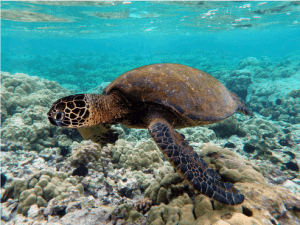Anahita Kodali, Life Sciences, News, Spring 2020
Figure 1: Coral reefs are an incredibly important component of ocean habitats. Not only do they provide a safe home for several species of marine life, but they also protect coastlines from damage, are a vital source of essential nutrients for oceanic food chains and help with nutrient recycling5.
Image Source: Wikimedia Commons
Climate change is one of the most important issues of our time. Carbon dioxide (CO2) emissions, which are produced by burning fossil fuels, are an especially harmful kind of emission, as they propagate the “green-house effect,” which is the trapping of the sun’s heat in lower portions of the Earth’s atmosphere; it is a major contributor to global warming (defined as an increase in temperature of the Earth’s atmosphere)1. There are several negative impacts of global warming. For one, global temperatures are on the rise; over the past 100 years, the average global temperature has risen about 1.4oF, and 2016 was the hottest year ever recorded2. We have also been experiencing extreme weather events, like polar jet stream migrations (the movement of cold Arctic waters down south), rise in intensity of hurricanes, and increases in the number of lightning strikes, heatwaves, droughts, blizzards, and rainstorms2. This is because global warming increases temperature, resulting in more moisture in the air. Finally, we have seen massive glacier ice melt, rising sea levels, and heightened acidification of our oceans2. In short, global warming is affecting every aspect of our lives and rapidly changing our environment.
In addition to all of the above, a team of researchers from the University of Palermo, the University of Tsukuba, and the University of Plymouth have released a study showing that higher CO2 concentrations in oceans can have a huge impact on marine habitats and aquatic life3. By studying the waters surrounding Shikine, a Japanese island, the team found that when CO2 levels are raised, algae begins to dominate aquatic habitats. Algae growth often comes at the expense of corals and macroalgae; and highly complex reefs are reduced significantly in terms of aquatic plant diversity. The consequence at Shikine was a staggering 45% decrease in fish diversity, much of which was associated with a change in feeding behavior and a loss of coral-inhabiting species4.
The team also found evidence supporting previous studies that showed the negative effects of oceanic acidification. Elevated CO2 levels cause a drop in the pH of seawater. This pH drop causes several changes for calcium-based habitats, such as coral reefs – the team found that under these conditions, calcification (which is the hardening of coral reefs that keeps them strong and healthy) was impaired. At the same time, dissolution of calcifying habitat-formers (the autotrophs that help to form and calcify coral reefs) was accelerated. In short, calcification of coral reefs was severely impaired, and destruction of coral reefs propagated, resulting in further loss of fish diversity in reef habitats4.
These findings offer further evidence that changes in oceanic conditions are having and will continue to have a significant impact on oceanic life. In order to reduce these impacts, we need to continue our efforts to reduce greenhouse gas emissions and curb global warming.
Bibliography
[1] Climate Science Glossary. (n.d.). Skeptical Science. Retrieved from https://www.skepticalscience.com/co2-pollutant.htm
[2] Bradford, A. (2017, August 12). Live Science. Effects of Global Warming. Retrieved from https://www.livescience.com/37057-global-warming-effects.html
[3] University of Plymouth. (2020, April 20). Rising carbon dioxide levels will change marine habitats and fish communities. ScienceDaily. Retrieved April 22, 2020 from www.sciencedaily.com/releases/2020/04/200420084257.htm
[4] Carlo Cattano, Sylvain Agostini, Ben P. Harvey, Shigeki Wada, Federico Quattrocchi, Gabriele Turco, Kazuo Inaba, Jason M. Hall-Spencer, Marco Milazzo. (2020). Changes in fish communities due to benthic habitat shifts under ocean acidification conditions. Science of The Total Environment, 725: 138501 DOI: 10.1016/j.scitotenv.2020.138501
[5] Bauer, & Adriana. (n.d.). Importance of Coral Reefs – Biodiscovery and the Great Barrier Reef – Queensland Museum. Queensland Museum. Retrieved from https://www.qm.qld.gov.au/microsites/biodiscovery/05human-impact/importance-of-coral-reefs.html


Leave a Reply